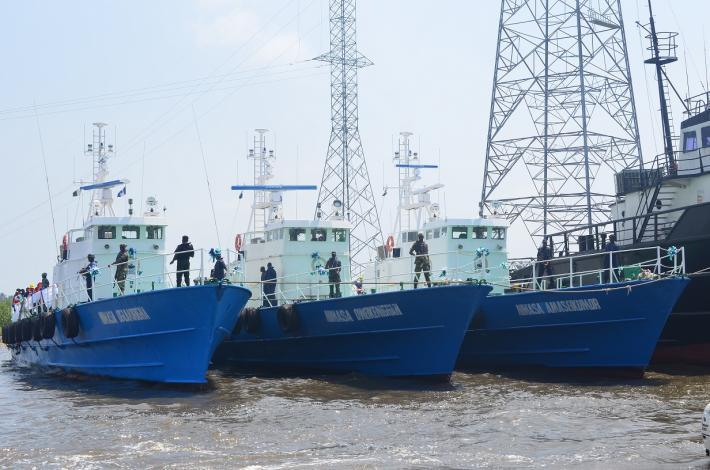- NIMASA Contractors Fail to Remit $286m Revenue – Reps
Private firms engaged by the Nigerian Maritime Administration and Safety Agency to collect revenue on its behalf have failed to remit money in excess of $286m to the Federal Government, the House of Representatives Committee on Marine Safety/Education alleged on Wednesday in Abuja.
The committee, which is chaired by Mr Mohammed Bago, is investigating the processes that led to the award of the contracts and others that had generated petitions and controversies since 2016.
One of them is the National Security Surveillance and Waterways contract that was awarded to an Israeli firm, HLI International Systems and Technologies Limited, for $198m.
The committee had summoned the Minister of Transportation, Mr Rotimi Amaechi, and the Director General of NIMASA, Dr Dakuku Peterside, to address the issues.
Also summoned were the officials of HLS and the various beneficiaries of the revenue contracts, which later became the subjects of petitions sent to the House.
However, on Wednesday, lawmakers paid more attention to the security surveillance contract, which was designed to monitor the country’s waterways and combat illegal activities.
Better known as the Deep Blue Project, it is designed in the first phase to train 1,000 naval personnel; 1,000 soldiers; 1,000 marine policemen; and 200 Department of State Service operatives, who will run intelligence gathering operations on the waterways and combat criminality.
The Israeli firm, in the second phase, will supply three special mission helicopters; 17 special patrol boats; two special mission aircraft; 16 fast vehicles; and four units of UAVs.
But, members raised questions on the alleged violation of due process requirements in the award of the $198m contract and the implications of getting a foreign firm involved with a project that could compromise Nigeria’s internal security.
Amaechi stayed away from the committee’s hearing, sending the ministry’s Director of Procurement, Mr Shehu Aliyu, to answer questions on his behalf.
He dismissed allegations of due process breaches, saying that after presidential and Federal Executive Council approvals were secured in 2016, a certificate of no objection was also obtained from the Bureau of Public Procurement.
He claimed that being a security contract, the law allowed for some waivers to fast-track the award.
NIMASA’s Executive Director, Mr Gambo Ahmed, who represented Peterside, told the committee that though he was aware that the agency had been under the watch of anti-graft agencies in the past, he reassured the lawmakers that the current management was different.
“All our contracts are transparent and our books are open. We are ready to provide any information that the committee wants us to provide,” Ahmed stated.
The Managing Director, HLS, Mr Tai Spektor, made a presentation to the committee to justify the competence of his firm and its ability to deliver the intelligence services covered under the contract.
Spektor, who dwelt much on the illegal activities taking place offshore Nigeria and the economic losses to the country, stated that over $70m was being lost to illegal fishing alone every year.

 Forex3 weeks ago
Forex3 weeks ago


 Naira2 weeks ago
Naira2 weeks ago
 Billionaire Watch2 weeks ago
Billionaire Watch2 weeks ago




 Naira2 weeks ago
Naira2 weeks ago




 Naira2 weeks ago
Naira2 weeks ago




 Naira1 week ago
Naira1 week ago




 Naira4 weeks ago
Naira4 weeks ago




 Naira3 weeks ago
Naira3 weeks ago






















